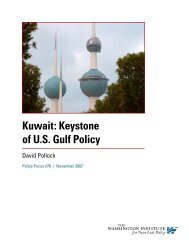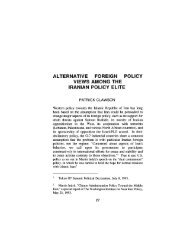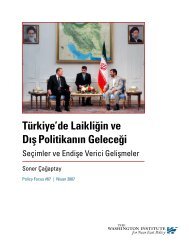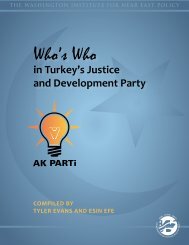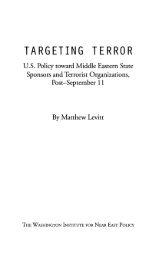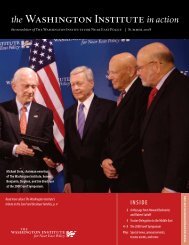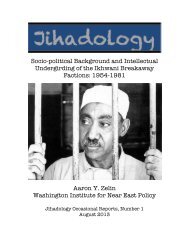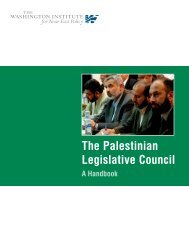Michael Eisenstadt David Pollock How the United States Benefits ...
Michael Eisenstadt David Pollock How the United States Benefits ...
Michael Eisenstadt David Pollock How the United States Benefits ...
You also want an ePaper? Increase the reach of your titles
YUMPU automatically turns print PDFs into web optimized ePapers that Google loves.
About <strong>the</strong> Authors<br />
MICHAEL EISENSTADT is director of <strong>the</strong> Military and Security Studies Program at The Washington<br />
Institute, focusing on irregular and conventional warfare and nuclear weapons proliferation in <strong>the</strong> Middle<br />
East. A former U.S. Army reservist, he served as an exchange officer with <strong>the</strong> Israel Defense Forces in 1989<br />
and on <strong>the</strong> staff of <strong>the</strong> <strong>United</strong> <strong>States</strong> Security Coordinator (USSC) for Israel and <strong>the</strong> Palestinian territories<br />
in 2008–2009. His publications include Knives, Tanks, and Missiles: Israel’s Security Revolution with Eliot<br />
Cohen and Andrew Bacevich (Washington Institute, 1998), The Last Arab-Israeli Battlefield? Implications of<br />
an Israeli Withdrawal from Lebanon with Patrick Clawson (Washington Institute, 2000), Iran’s Influence in<br />
Iraq: Countering Tehran’s Whole-of-Government Approach with <strong>Michael</strong> Knights and Ahmed Ali (Washington<br />
Institute, 2011), and The Strategic Culture of <strong>the</strong> Islamic Republic of Iran: Operational and Policy Implications<br />
(Marine Corps University, 2011).<br />
DAVID POLLOCK is <strong>the</strong> Kaufman fellow at The Washington Institute, focusing on Mideast political<br />
dynamics and U.S. policy in <strong>the</strong> region. He is also editor-in-chief of <strong>the</strong> Institute’s Arabic website and<br />
<strong>the</strong> Fikra Forum Arabic/English blog. Previously, he served as senior advisor for <strong>the</strong> Broader Middle East<br />
(2002–2007), senior regional expert on <strong>the</strong> secretary’s Policy Planning Staff at <strong>the</strong> Department of State<br />
(1996–2001), and chief of Near East/South Asia/Africa research at <strong>the</strong> U.S. Information Agency. Fluent in<br />
both Hebrew and Arabic, he holds a PhD in Mideast studies and political science from Harvard University<br />
and has taught at Harvard and George Washington University. His previous Washington Institute monographs<br />
include <strong>the</strong> edited collection Prevent Breakdown, Prepare for Breakthrough: <strong>How</strong> President Obama<br />
Can Promote Israeli-Palestinian Peace (2008) and Actions, Not Just Attitudes: A New Paradigm for U.S.-Arab<br />
Relations (2010).<br />
n n n<br />
The opinions expressed in this report are those of <strong>the</strong> authors and not necessarily those of<br />
The Washington Institute for Near East Policy, its Board of Trustees,<br />
or its Board of Advisors.<br />
The WashingTon insTiTuTe for near easT Policy v



